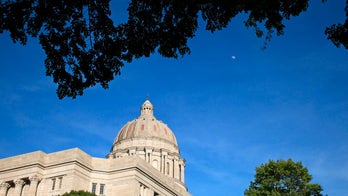Senate Majority Leader Harry Reid, D-Nev., has worked to reassure fellow Democrats during the August recess that his party would not lose control of the Senate if the election were held now.
"They'd have to pick up six seats, it'd be very, very hard for them to do that," Reid told Reno's KTVN earlier this month.
However, the election is still 10 weeks from Tuesday, and Democrats who once felt the party would retain their majority are now worried the GOP's momentum could cost them even more than the six seats necessary for Republicans to retake control.
"We all thought four were in the bag [for Republicans]," Democratic campaign strategist Joe Trippi said. "But right now, it's looking like the bottom end of that scale isn't four anymore, it's five or six. And that means the entire Senate majority is on the bubble."
In several races, Republicans are pulling away from their Democratic rivals.
South Dakota's popular Republican Gov. Mike Rounds has opened a double-digit lead over Democrat Rick Weiland in recent polls in that state's Senate race. Even Reid admits Republicans are likely to win the seat of retiring Democratic Sen. Tim Johnson.
In Montana, Republican Rep. Steve Daines has become a heavy favorite after acting Democratic Sen. John Walsh dropped out of the race amid allegations of plagiarism.
A Rasmussen Reports poll shows Daines with a 20-point lead over Walsh's replacement, state lawmaker Amanda Curtis, who touts her inexperience as an asset.
Recent polls from West Virginia also show Republican Rep. Shelley Moore Capito opening up a double-digit lead over Democratic Secretary of State Natalie Tennant.
Several other battleground contests remain close, but show Republicans gaining steam. In Arkansas, freshman Republican Rep. Tom Cotton has edged ahead of two-term Democratic incumbent Sen. Mark Pryor, 46 percent to 43 percent, according to the RealClearPolitics average of polls.
Vulnerable freshman Democratic Sen. Kay Hagan also is battling for her political life in North Carolina. Recent polls have the state's House speaker Thom Tillis just inching ahead of Hagan in a sometimes-blue state that's turning redder.
And in Louisiana, the marquee race between Republican Rep. Bill Cassidy and three-term Democratic incumbent Sen. Mary Landrieu is a dead heat. Due to the state's "jungle primary" system, where candidates of all parties compete, if no candidate reaches more than 50 percent in November, it heads to a December runoff.
Democrats know President Obama's unpopularity has been hurting the party's candidates in Republican-leaning states. If 2014 becomes a referendum on the president, and a GOP wave sweeps across the country, at least four more Democrats in other states could get sent packing.
"I think we can pick up the six, maybe even a couple more," Republican campaign strategist Ed Rollins said. "The momentum's going our way. The president is certainly a drag on the Democrat ticket."
The states that could fall in a potential GOP tidal wave include New Hampshire, Iowa, Colorado and Alaska.
The latest WMUR-University of New Hampshire poll shows former Massachusetts Republican Sen. Scott Brown within 2 points of incumbent Democratic Sen. Jeanne Shaheen in New Hampshire.
In Iowa, where the battle is on to replace retiring Democratic Sen. Tom Harkin, Republican state lawmaker Joni Ernst is in a virtual tie with Democratic Rep. Bruce Braley.
Recent polls in Colorado have incumbent Sen. Mark Udall clinging to a 3-point edge over popular Republican Rep. Cory Gardner, who is using Obama to attack Udall.
And in Alaska, with the field set just last week after the Republican primary, Democratic Sen. Mark Begich has a slight lead over the state's former attorney general Dan Sullivan, according to the RealClearPolitics polling average.
Other political analysts aren't so sure about Republicans' chances. Larry Sabato, director of the University of Virginia Center for Politics, co-authored a piece in Politico arguing that while Republican candidates will likely pick up seats this year, several candidates have "not yet opened up a real polling lead" in key toss-up races.
Democrats aren't sitting back either. They are targeting the red states of Kentucky and Georgia, though recent polling has Republicans leading both races.





